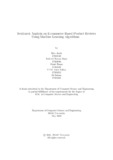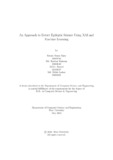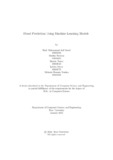| dc.contributor.advisor | Karim, Dewan Ziaul | |
| dc.contributor.advisor | Saha, Ramkrishna | |
| dc.contributor.author | Arobi, Ritu | |
| dc.contributor.author | Rijon, Rakibul Hassan | |
| dc.contributor.author | Haque, Nimul | |
| dc.contributor.author | Safkat, T.I.M. Sakir | |
| dc.contributor.author | Safoan, Sk | |
| dc.date.accessioned | 2023-03-30T03:44:27Z | |
| dc.date.available | 2023-03-30T03:44:27Z | |
| dc.date.copyright | 2022 | |
| dc.date.issued | 2022-05 | |
| dc.identifier.other | ID 17101330 | |
| dc.identifier.other | ID 17301090 | |
| dc.identifier.other | ID 17301136 | |
| dc.identifier.other | ID 17201112 | |
| dc.identifier.other | ID 17301160 | |
| dc.identifier.uri | http://hdl.handle.net/10361/18038 | |
| dc.description | This thesis is submitted in partial fulfillment of the requirements for the degree of Bachelor of Science in Computer Science, 2022. | en_US |
| dc.description | Cataloged from PDF version of thesis. | |
| dc.description | Includes bibliographical references (pages 52-56). | |
| dc.description.abstract | Opinions from others can be important when a choice is necessary, mainly when
valuable resources such as time and wealth are involved. People often depend on
their peers’ past experiences. The analysis of sentiments or opinions is a computation
using text analysis of people’s emotions, thoughts, and feelings. In recent years, it
became the most significant natural language processing and sentiment analysis
research approach. Because it is founded on people’s views and as all people have
different viewpoints to see things, it is becoming more popular every day. In this
digital world, when a person decides to purchase a product or utilize a service, they
get access to many customer evaluations. Still, it is a tiresome process to read
and analyze them all. Moreover, when an organization wants to make a profit,
find new possibilities, anticipate sales trends, and manage its reputation via public
opinion or sell its product, it also needs to address many customer remarks accessible
to its customers. Therefore, our goal is to show that it is feasible to do so with
sentiment analysis approaches. With sentiment analysis, it is easy to analyze and
extract a vast number of accessible data comments from both consumers that can
aid in fulfilling the objectives of the organization. The dataset utilized here is
obtained from the Ali-Express e-commerce website’s online product reviews. We
use various data processing techniques such as tokenization, removal of punctuation
marks and stop words, stemming, TF-IDF, and parts of speech tagging. The results
of our study comprise several methods of machine learning techniques. In this
work, we examined eight distinct types of Machine Learning Algorithms, including
Naive Bayes Classifier, SVM, Random Forest Classifier, Logistic Regression (L.R.),
K- nearest neighbors, XGBoost Classifier, Decision Tree Classifier, and Gradient
Boosting, and compared their precision and accuracy to find the most accurate one.
According to our analysis, Logistic Regression is performing better among all the
other seven classifiers having an accuracy of around 98%, and KNN is performing
lowest, having an accuracy of 46%. Other classifiers such as Decision Tree is, giving
69%, Gradient Boosting 63%, Naive Bayes and SVM 82%, and Random Forest and
XGBoost are giving 80% of accuracy. | en_US |
| dc.description.statementofresponsibility | Ritu Arobi | |
| dc.description.statementofresponsibility | Rakibul Hassan Rijon | |
| dc.description.statementofresponsibility | Nimul Haque | |
| dc.description.statementofresponsibility | T.I.M. Sakir Safkat | |
| dc.description.statementofresponsibility | Sk Safoan | |
| dc.format.extent | 56 pages | |
| dc.language.iso | en | en_US |
| dc.publisher | Brac University | en_US |
| dc.rights | Brac University theses are protected by copyright. They may be viewed from this source for any purpose, but reproduction or distribution in any format is prohibited without written permission. | |
| dc.subject | Tokenization | en_US |
| dc.subject | Naive Bayes Classifier | en_US |
| dc.subject | SVM | en_US |
| dc.subject | Random Forest Classifier | en_US |
| dc.subject | Logistic Regression (L.R.) | en_US |
| dc.subject | K-nearest neighbors | en_US |
| dc.subject | XGBoost classifier | en_US |
| dc.subject | Decision Tree Classifier(DTC) | en_US |
| dc.subject | Gradient boosting classifier | en_US |
| dc.subject | TF-IDF | en_US |
| dc.subject.lcsh | Machine learning | |
| dc.subject.lcsh | Mathematical statistics--Data processing | |
| dc.title | Sentiment analysis on E-commerce based product reviews using machine learning algorithms | en_US |
| dc.type | Thesis | en_US |
| dc.contributor.department | Department of Computer Science and Engineering, Brac University | |
| dc.description.degree | B. Computer Science | |




